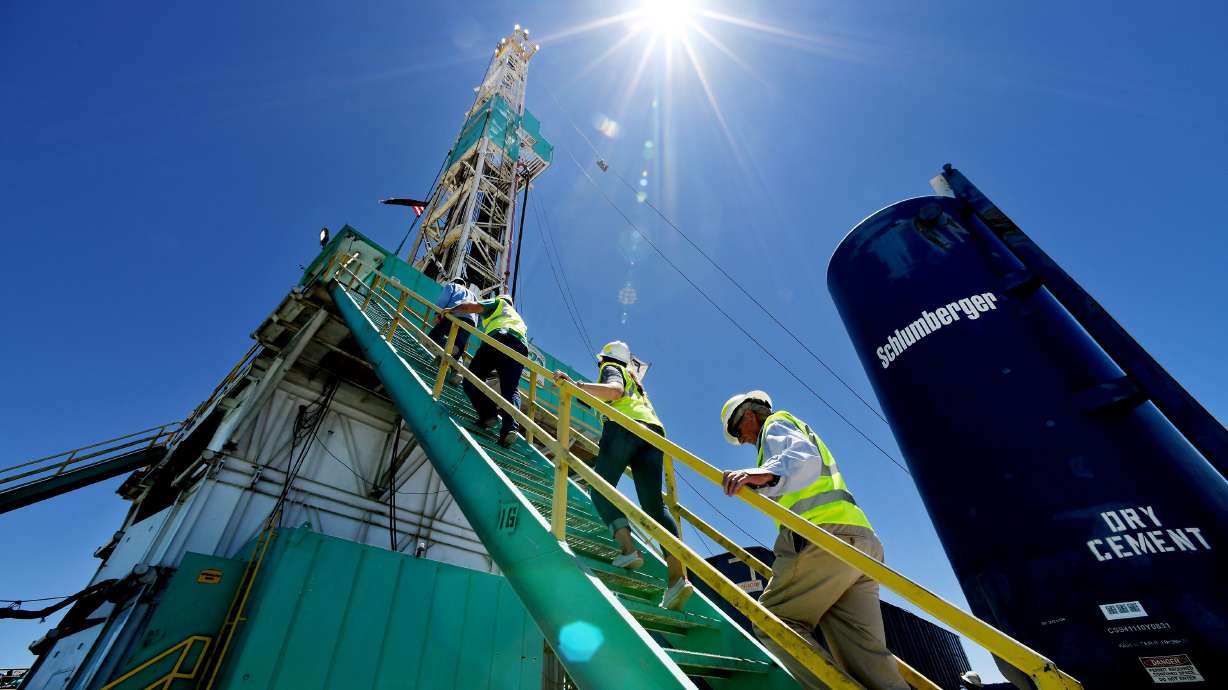Estimated read time: 4-5 minutes
This archived news story is available only for your personal, non-commercial use. Information in the story may be outdated or superseded by additional information. Reading or replaying the story in its archived form does not constitute a republication of the story.
MILFORD, Beaver County — If one didn't know better, Joseph Moore could be talking about one of his grandchildren or a shiny sports car parked in his garage.
But on this day, amid a blustery desert wind against the backdrop of a barren sagebrush landscape north of Milford, Beaver County, Moore is talking about rocks, drilling rigs, super hot heat and the power of the ground that lies beneath him.
Moore is principal investigator of the Frontier Observatory for Research in Geothermal Energy, or FORGE, a U.S. Department of Energy project aiming to bring geothermal energy to the market on a utility scale that is financially viable and scientifically sound.
The day before the Thursday media tour of the site, the project reached a milestone — proving two deep vertical wells that link to a long horizontal conduit are indeed connected — much like a radiator in a car that operates on a circulating loop.
"It's the first time we made that connection," Moore said, smiling.
The project injected 1,800 barrels of water into one well, at five barrels a minute, and achieved success when it flowed along the horizontal pathway to travel up the production well.

Moore, a research professor at the University of Utah's Energy and Geoscience Institute, said FORGE distinguishes itself from conventional geothermal extraction because it is creating the reservoir itself from which the energy is tapped.
Water is pumped deep into the super-heated rocks thousands of feet underground to ultimately turn into steam to power a turbine to produce electrons. Imagine capturing that steam from geothermal pools throughout the West.
Not far away from FORGE sits PacifiCorp's Blundell Geothermal Plant which produces 38 megawatts of energy from an existing underground water resource — but at much lower temperatures.
Both Moore and co-principal investigator John McLennan said heat is simultaneously their friend and foe as they strive to fulfill the first phase of the $220 million U.S. Department of Energy project.
"The hotter we get, the more energy we can produce," Moore said, adding that conventional plants use temperatures nearing 500 degrees while 705 degrees is the target here — if FORGE can get it to work.
"There is a tremendous amount of energy at that temperature," Moore said.
But getting all the equipment to withstand that heat and continue to operate with structural integrity is not easy.
"Temperatures have been a particular challenge here," McLennan said.
Moore and others, however, are not deterred, because of the clean energy hope the ground has to offer.
They pointed to statistics by the U.S. Geological Survey of an estimated untapped potential of 518,000 megawatts of geothermal resources that exist in the western United States alone.
Utah, in fact, is third in the country for its energy produced by geothermal, behind California and Nevada.
Moore said there has been unwavering bipartisan support for the project since Utah's FORGE site was selected from a fierce list of competitors, even beating out the U.S Department of Energy's own national laboratories.
Utah's vast geothermal potential has attracted the investment of private industry over the years and recently was reignited with a company called Fervo that is using the same horizontal drilling technology at a site not far from FORGE.
Rep. Carl Albrecht, R-Richfield, said he is optimistic about FORGE and anxious to see more results.
"There's not a lot of the environment that you can hurt down there with geothermal, frankly," said Albrecht, chairman of the state Legislature's House Public Utilities, Energy and Technology Committee.
One reason the Milford site stood out in the selection process is that it is considered "aseismic" and to date, the largest scale of seismic activity that happened with the fracturing of rocks was logged at .5 magnitude, McLennan said, stressing the activity is monitored constantly.
Albrecht said he would like to see more development of geothermal resources in Utah.
"There's lots of places in the state where there's geothermal, but it's been proven as a good resource down there in Beaver County. I would just like to see more development because, you know, it is a renewable and you can count on it 24/7."
This first phase of the project is due to wrap up in 2024, with an eye toward continuing to the second phase through 2032, depending on more funding.
Moore said the goal is to extract heat for a long period of time.
"Ultimately we will be injecting hundreds of gallons of water into the well."










